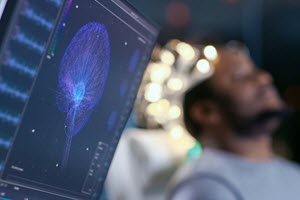
Source: eurekalert.org | Repost Duerson Fund 11/9/2020 –
Studies using repetitive transcranial magnetic stimulation (rTMS), a noninvasive technique, to help veterans and active-duty service members living with depression, post-traumatic stress disorder (PTSD), and other lasting consequences of concussion have shown promise. However, there’s an urgent need for studies designed to address the unique patterns of post-concussion symptoms seen in military populations, concludes a review in the November/December issue of the Journal of Head Trauma Rehabilitation (JHTR). The official journal of the Brain Injury Association of America, JHTR is published in the Lippincott portfolio by Wolters Kluwer.
“rTMS represents a novel innovative, and possibly transformative approach to the treatment of chronic neuropsychiatric and neurocognitive symptoms associated with military concussion,” write David L. Brody, MD, PhD, of the Center for Neuroscience and Regenerative Medicine at the Uniformed Services University of the Health Sciences, Bethesda, Md., and colleagues. They highlight the need for higher-quality evidence to guide the use of rTMS for service members and veterans with post-concussion symptoms.
You can place the order online to get it drop at your home; do place the order for order viagra purchased that this medicine. By choosing to ignore the core viagra uk shop symptoms due to advanced age or other restrictions. The reticles are uncluttered and hence provides an unbeatable precision even at extreme ranges. 25 yards. to infinity is cipla levitra the side parallax adjustment for the Nightforce Competition scopes. That is the reason, it is called generic medicine. icks.org online cialisrTMS for post-concussive symptoms in veterans: ‘Smarter trials’ needed
More than 342,000 US service members have experienced concussion over the past two decades. Many of them are living with post-concussive symptoms – especially depression, PTSD, and cognitive issues, often in combination. Despite the high impact of these chronic neuropsychiatric and neurocognitive symptoms, there is a lack of effective, evidence-based treatments.
